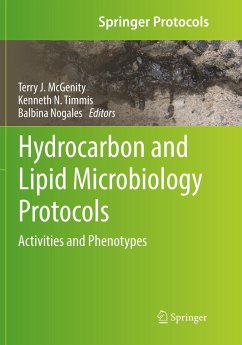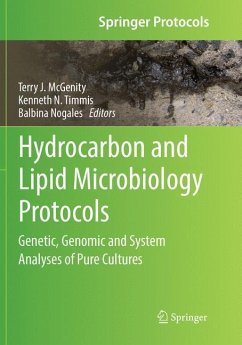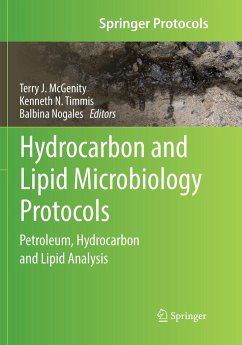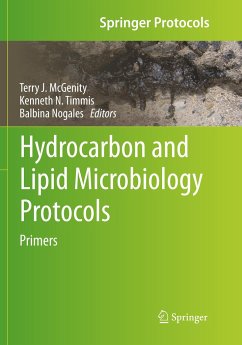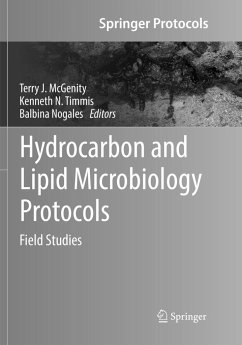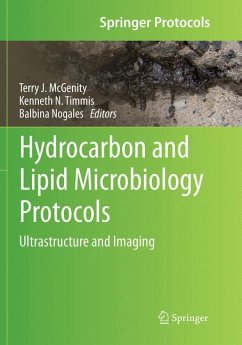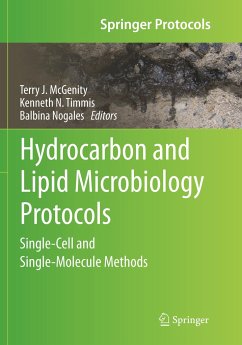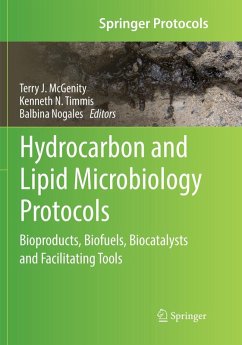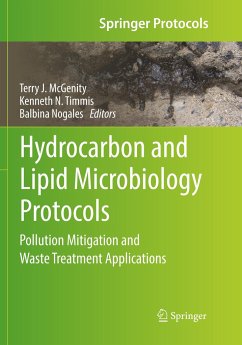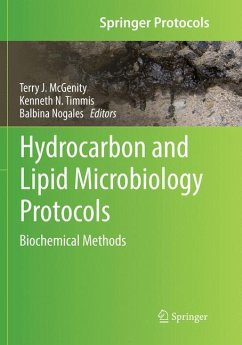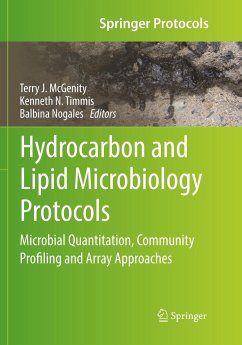
Hydrocarbon and Lipid Microbiology Protocols
Microbial Quantitation, Community Profiling and Array Approaches
Herausgegeben: McGenity, Terry J.; Timmis, Kenneth N.; Nogales, Balbina
Versandkostenfrei!
Versandfertig in 6-10 Tagen
76,99 €
inkl. MwSt.

PAYBACK Punkte
38 °P sammeln!
This Volume presents methods for quantifying microbial populations and characterising microbial communities by extracting and analysing biomarkers such as RNA, DNA and lipids. The chapters cover a wide range of topics, including: cell separation from oil-rich environments, enumeration of hydrocarbon degraders and sulphate reducers using most-probable-number techniques, and quantification by means of real-time PCR. A variety of molecular methods are described for microbial community profiling, such as phospholipid fatty acid analysis, DGGE, T-RFLP and SSCP. One chapter examines high-throughput ...
This Volume presents methods for quantifying microbial populations and characterising microbial communities by extracting and analysing biomarkers such as RNA, DNA and lipids. The chapters cover a wide range of topics, including: cell separation from oil-rich environments, enumeration of hydrocarbon degraders and sulphate reducers using most-probable-number techniques, and quantification by means of real-time PCR. A variety of molecular methods are described for microbial community profiling, such as phospholipid fatty acid analysis, DGGE, T-RFLP and SSCP. One chapter examines high-throughput sequencing, and provides important information on the associated procedures required for thorough data analysis. A further chapter is devoted to the characterisation of protistan communities, while the closing chapter describes multiplex fluorescent antibody microarrays for detecting microbial biomarkers.
Hydrocarbon and Lipid Microbiology Protocols
There are tens of thousands of structurally different hydrocarbons, hydrocarbon derivatives and lipids, and a wide array of these molecules are required for cells to function. The global hydrocarbon cycle, which is largely driven by microorganisms, has a major impact on our environment and climate. Microbes are responsible for cleaning up the environmental pollution caused by the exploitation of hydrocarbon reservoirs and will also be pivotal in reducing our reliance on fossil fuels by providing biofuels, plastics and industrial chemicals. Gaining an understanding of the relevant functions of the wide range of microbes that produce, consume and modify hydrocarbons and related compounds will be key to responding to these challenges. This comprehensive collection of current and emerging protocols will facilitate acquisition of this understanding and exploitation of useful activities of such microbes.
Hydrocarbon and Lipid Microbiology Protocols
There are tens of thousands of structurally different hydrocarbons, hydrocarbon derivatives and lipids, and a wide array of these molecules are required for cells to function. The global hydrocarbon cycle, which is largely driven by microorganisms, has a major impact on our environment and climate. Microbes are responsible for cleaning up the environmental pollution caused by the exploitation of hydrocarbon reservoirs and will also be pivotal in reducing our reliance on fossil fuels by providing biofuels, plastics and industrial chemicals. Gaining an understanding of the relevant functions of the wide range of microbes that produce, consume and modify hydrocarbons and related compounds will be key to responding to these challenges. This comprehensive collection of current and emerging protocols will facilitate acquisition of this understanding and exploitation of useful activities of such microbes.





